Rabbits are fluffy, puffy, and maybe even lucky. They have 4 rabbit’s feet after all! Jokes aside, rabbits are plant eaters, in other words, herbivores, and to raise them well, you have to feed them well. In this rabbit food guide, we’ll look at the best food for rabbits and share with you useful feeding tips
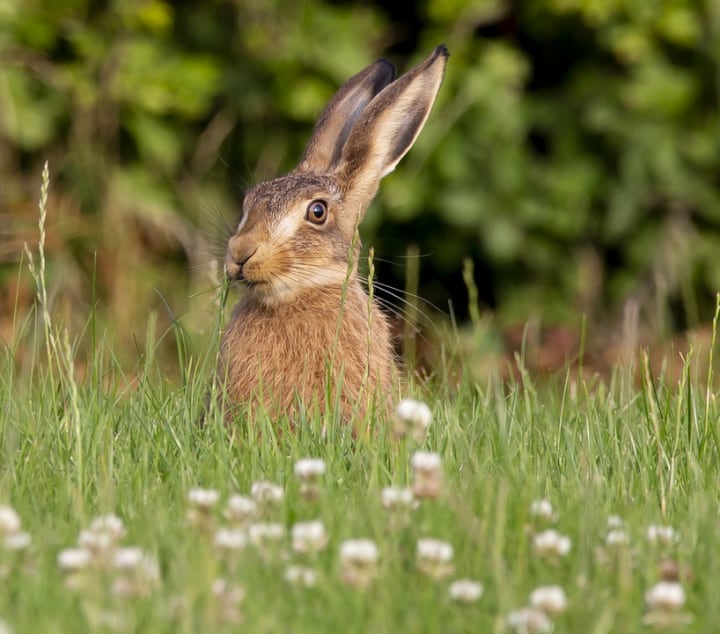
Rabbits are lucky because unlike humans, they are quite efficient at processing food. However, Rabbits are sensitive clouds of happiness. If you feed them bad food, their digestive bacteria will be disrupted causing them to become ill.
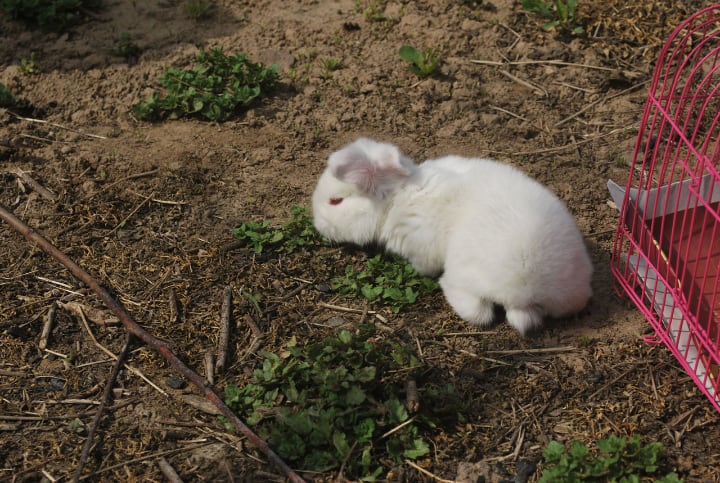
Rabbit food is not rocket science. You just need to pick the right one. And that’s what this guide is all about.
Let’s take a thorough look at the ideal food for rabbits that you should feed your Bugs Bunny.
What to Feed Rabbits?
It’s no brainer that rabbits eat, eat, and eat 24/7.
The most common food for rabbits is hay. But vegetables such as bok choy, mustard greens, or carrot tops plus a small number of pellets will do the trick as well.
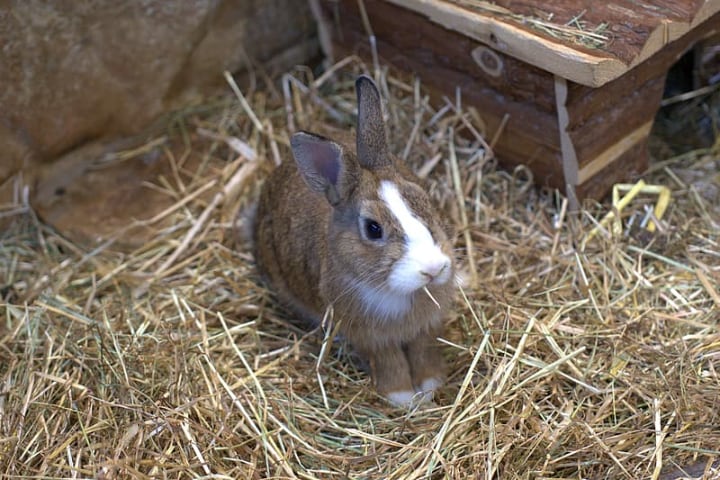
The crucial part is to feed them lots of rabbit food that is rich in fiber. But keep in mind that not every type of herb or vegetable will be good for your rabbit.
Are Carrots Good for Rabbits?
Bugs Bunny is always holding a carrot. So, carrots should be a portion of great food for rabbits. Right?
Wrong!
A carrot for a rabbit is like a candy bar for humans. It’s basically a treat. Like humans shouldn’t consume too much candy, rabbits should refrain from eating too many carrots.
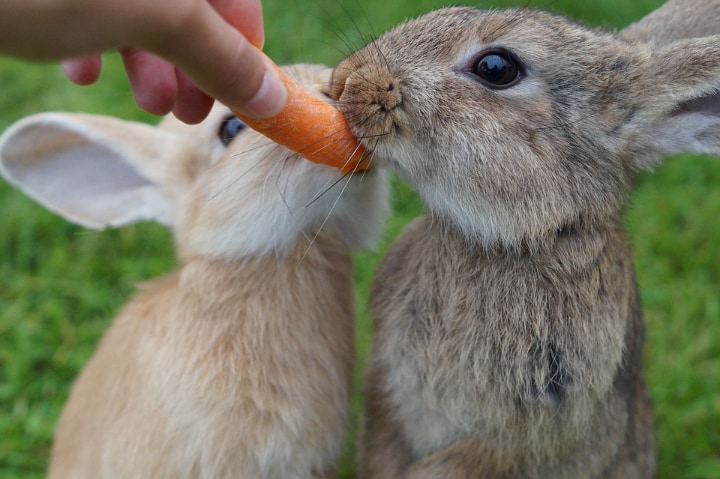
Carrots are high in carbohydrates. But 1 or 2 tablespoons of carrot won’t do them any harm either.
Warning: Too much carrot consumption can cause digestive issues and stomach discomfort for rabbits.
You don’t need an obese and unhealthy Rabbit, do you?
Fruit for Rabbits: A Good Idea?
Although fruits are great for us, only 10% of fruits should be in a rabbit’s diet. Fruits only contain natural sugars but still, you should stuff your rabbit with them.
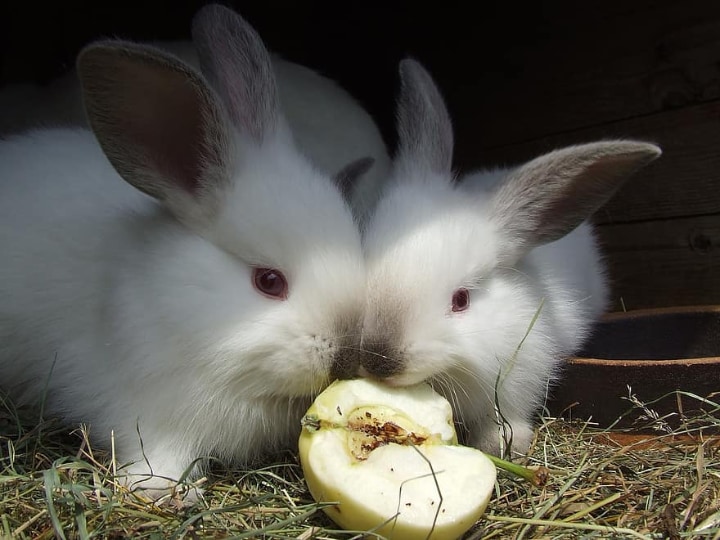
In fact, too much sugary rabbit food leads to an unhealthy rabbit. Plus, you should never offer fruits with their seeds to your long-eared friends.
Best Rabbit Food
There is no one size fits all type of food rabbits can eat. But, choose at least 3 types of vegetables to serve each day. This way you can provide them with a balanced diet.
Imagine giving your fluff ball a delicious salad. The more veggies they have in their bowl, the more chewing motions they will have.
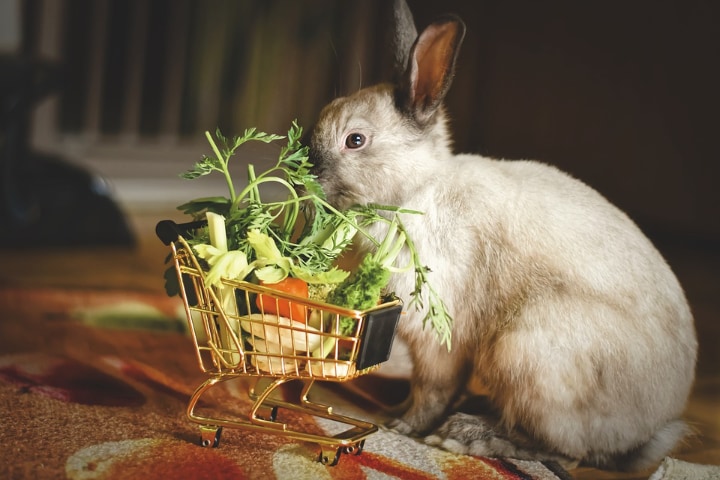
Do this and your rabbit will enjoy teeth grinding to the fullest.
Fact: Rabbits’ teeth are growing endlessly!
Best Vegetables for Rabbits
Rabbits live for veggies so it’s not at all tricky to find the perfect veggies for your rabbit. The only thing you should keep in mind is that there are some exceptions.
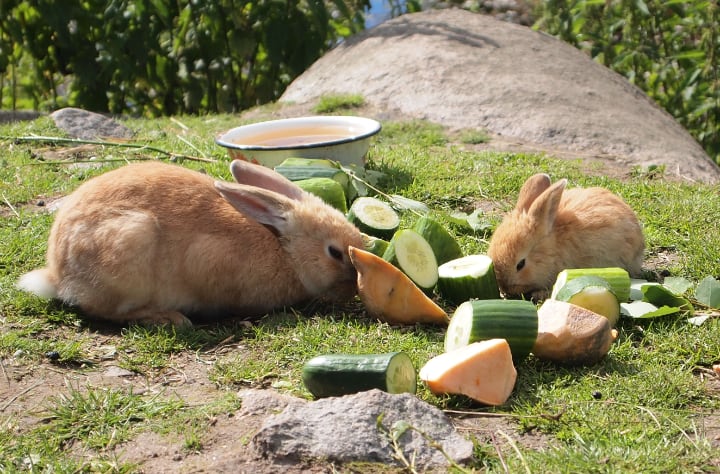
If you avoid those veggies when you shop, your rabbit will be alright.
Good to know: Adult rabbits will devour 2 cups of fresh vegetables in a heartbeat. However, if your rabbit belongs to a dwarf breed or weighs less than 5 pounds, just one cup would suffice for a day.
The other fundamental tip you should remember is to incorporate new vegetables now and then. Don’t just throw them into the rabbit cage.
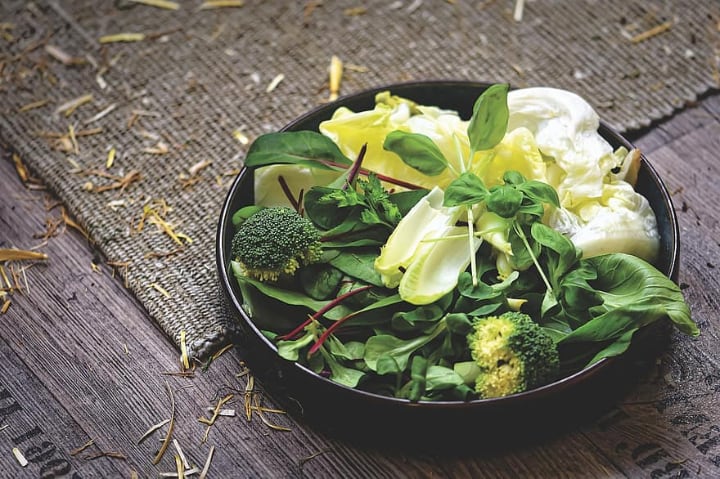
Tip: Slowly introduce a new veggie into the rabbit bowl and see how the rabbit reacts.
Bear in mind that certain veggies can cause diarrhea in rabbits. If you see signs of loose stools, you might want to re-think your rabbit’s diet.
Here are some of the veggies you can offer your rabbit daily.
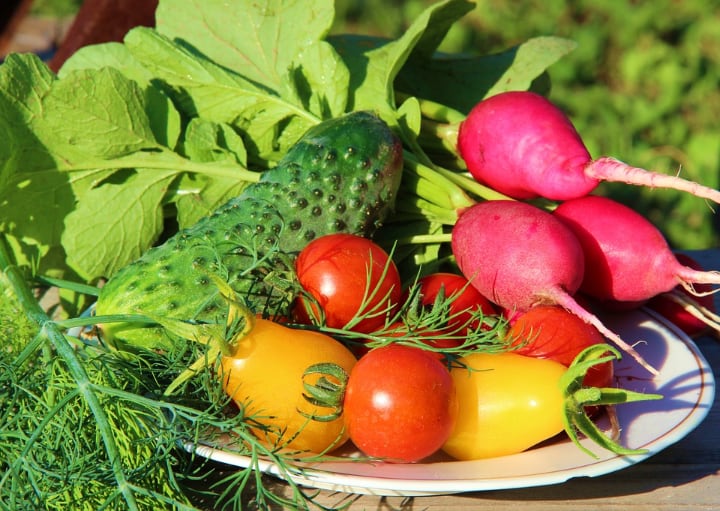
- Sprouts such as Alfalfa and Radish. Keep in mind that hay like Alfalfa has a higher content of calcium and protein that won’t be ideal for adult rabbits.
- Radish tops
- Carrot tops
- Lettuces such as Romaine, Butter, Red leaf, Boston bibb, Green leaf, Arugula
- Bell Peppers
- Brussels Sprouts
- Cucumber
- Endive
- Okra leaves
- Watercress
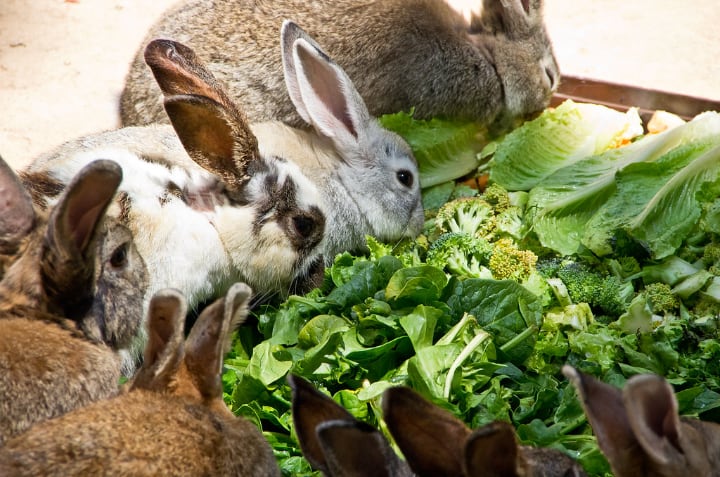
Tip: You can feed your rabbits vegetables such as Broccoli stems and leaves, Carrots, Collard greens, Kale, Spinach once or twice a week. Not more than that!
Best Fruits for Rabbits
Rabbits love fruit treats. But you shouldn’t give your rabbits fruits more than twice a week. Why? Because fruits are high sugar rabbit food. Remember?
Check out this list of safe fruits you can feed your Rabbit. In moderation!
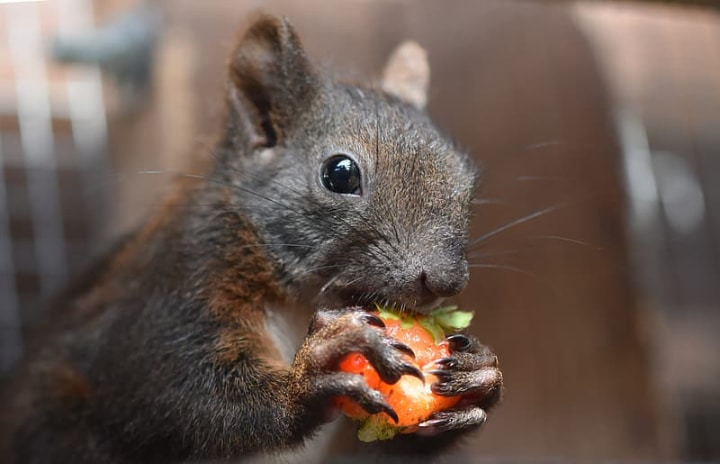
- Strawberries
- Blueberries
- Blackberries
- Apples. Give 1 or 2 slices of an apple to your Rabbit once a week. Avoid offering the seeds or the stem.
- Bananas are great because they have a high potassium content.
- Grapes
- Mangos
- Oranges without the peel
- Papayas
- Peaches
- Kiwi Fruits
- Melons
Tip: Wash everything before serving and don’t let your rabbit consume seeds and pits as these are poisonous.
Best Herbs for Rabbits
Not all herbs are safe for rabbits (more on that later) but many are.
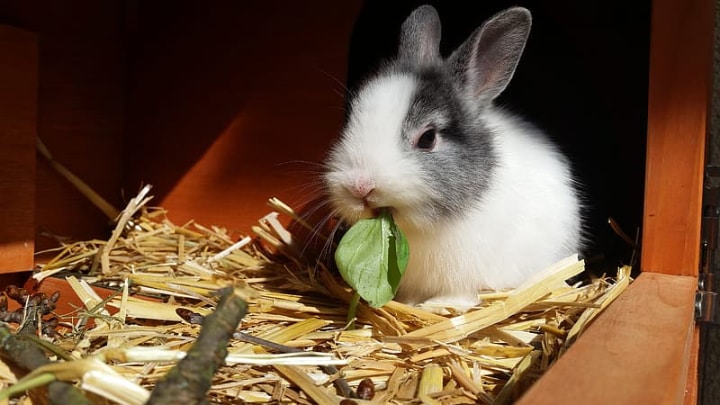
The following rabbit-safe herbs are probably growing in your backyard (if you’ve read our growing guides, that is!).
- Basil
- Oregano
- Cilantro
- Rosemary
- Parsley
- Lavender
- Tarragon
- Caraway
- Peppermint
- Sage
- Dill
- Lemon balm
- Comfrey
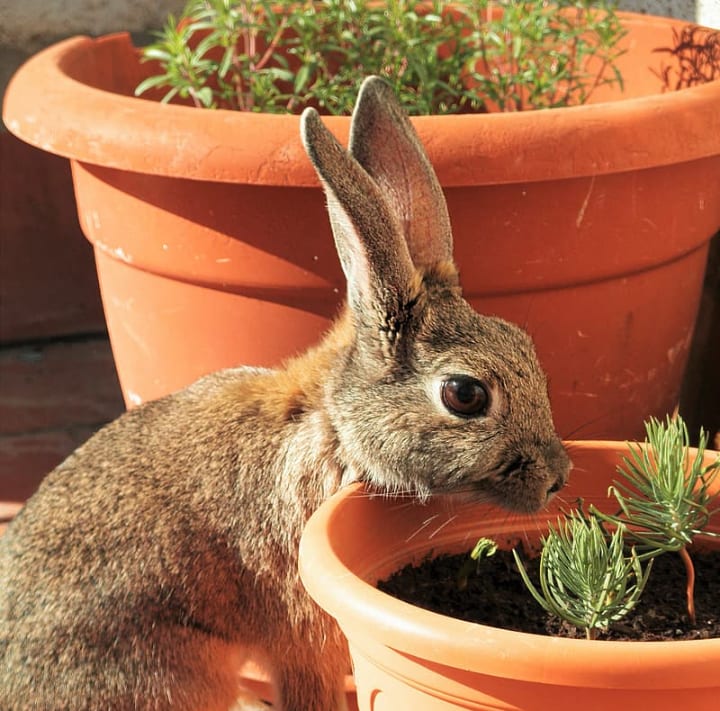
Tip: If you’re uncertain about a herb, don’t give them to your rabbit. Remember, you are not in Loony Tunes!
Best Flowers for Rabbits
Flower petals are a good source of food for rabbits. However, there are certain petals they cannot eat. Wild Rabbits, on the other hand, are pros at choosing the right flowers from wrong.
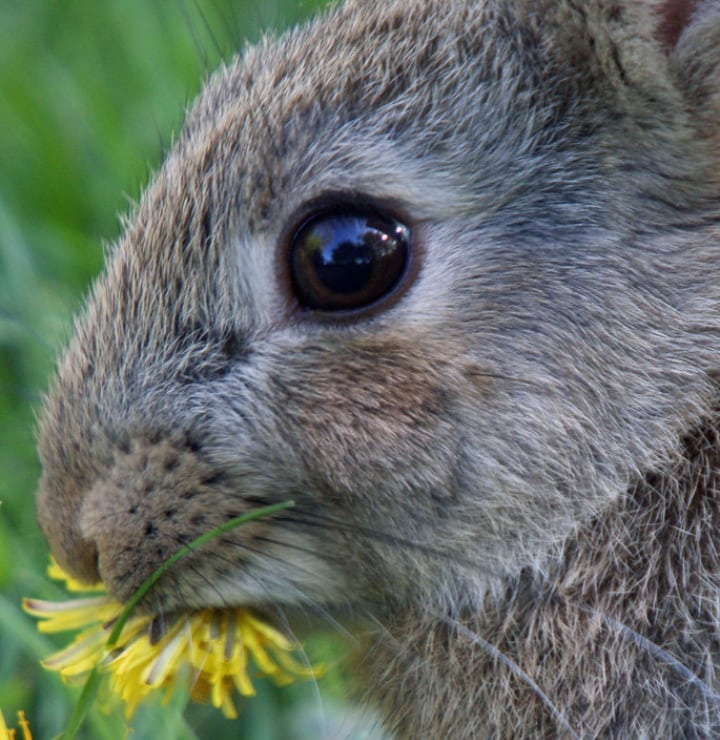
This is the main problem with domestic rabbits. They have no natural instinct to choose the best food for them because they are trained to have someone else make their food choices for them (in this case, you).
With that said, here are some healthy flower petals you can feed your Rabbit.
If you come across an unknown flower, conduct quick research before feeding it to your bunny.
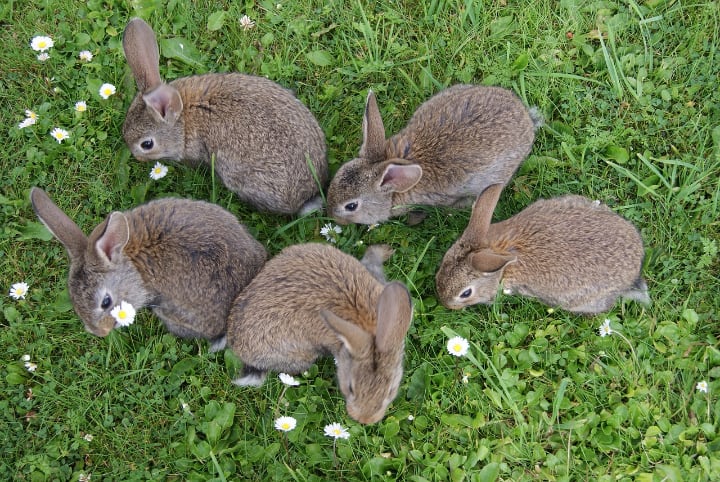
Tip: Make sure to find chemicals and pesticides free flowers. When shopping for rabbit food, only buy flowers marked as “edible”.
Best Pellets for Rabbits
Prepackaged food is convenient. However, it’s best not to give it to your rabbit regularly.
While it does provide the necessary nutrients for your bunny, it doesn’t have enough fiber to regulate food inside rabbits’ tummies.
Because rabbits are natural plant-eaters, most pellets won’t give their teeth the real grinding motion that they require. Still, given in moderation with other rabbit food, pellets are totally fine.
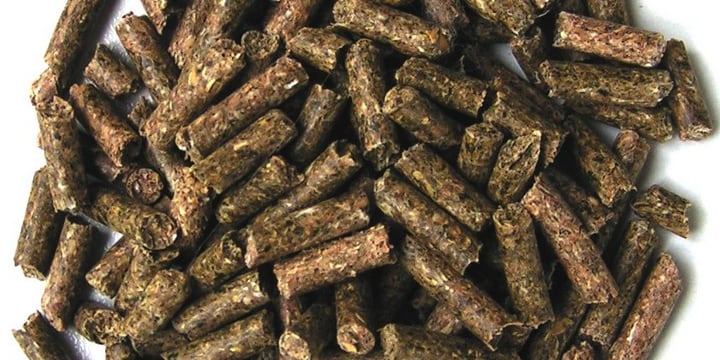
There are two kinds of pre-packaged food you can find at the store: muesli-style mixes or pellets.
- Mixes are cereal-based. They contain flaked peas, locust beans, and corn, etc.
- Rabbit pellets, on the other hand, contain grass-based ingredients. They are processed as nuggets.
Good to know: You can feed your rabbit a sufficient amount of greens and 10g of pellets per 1kg of body weight. The reason for this is that pre-packaged rabbit food is often loaded with nutrients.
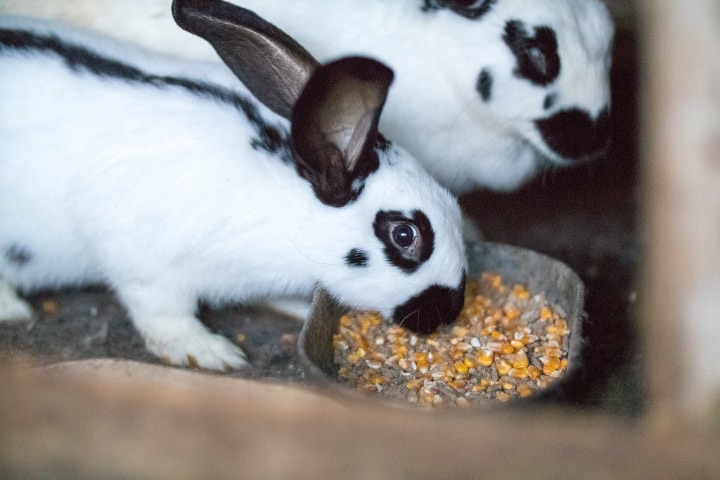
Best Hay for Rabbits
Rabbits need a crazy amount of hay, and hay should be a staple in your own rabbits’ diet. In fact, 80-90% of their diet must contain hay.
Hay helps rabbits regulate food inside their tiny tummies. Hay has quite long fibers that support a strong gut. If your rabbit doesn’t get enough hay, it might face serious intestinal issues.
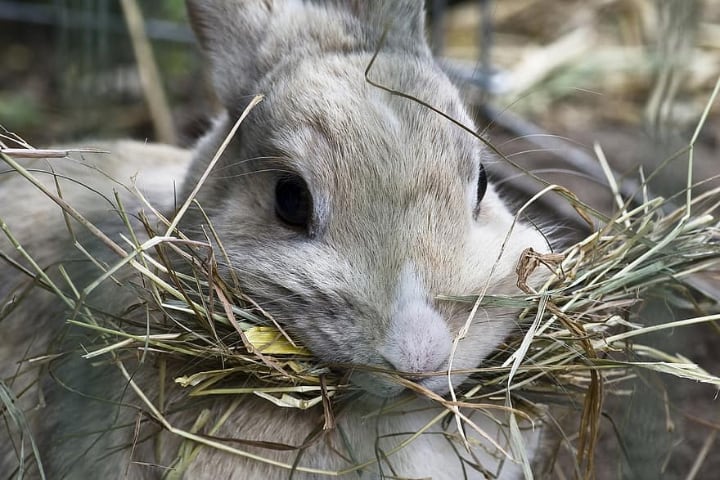
Rabbits need constant hay chewing in their lives. If not, your fluff ball’s teeth overgrow, causing it extreme pain.
If you think giving pellets will do the trick, think again. Pellets won’t give the rabbits the ideal side-to-side jaw action that hay provides.
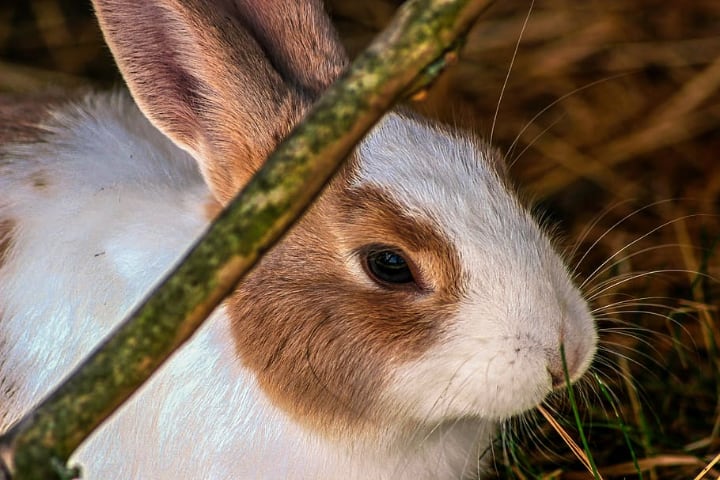
Fact: Rabbits have 28 teeth and they grow 12cm per year. Letting grow too big may actually get you into trouble with the law!
What’s Not Safe Food for Rabbits
Rabbits have delicate digestive systems. If you feed them the wrong food, you’ll see they become unwell and even die. Some foods don’t just upset your bunny’s tum, but downright poison it.
Here are some of the worst food for rabbits.
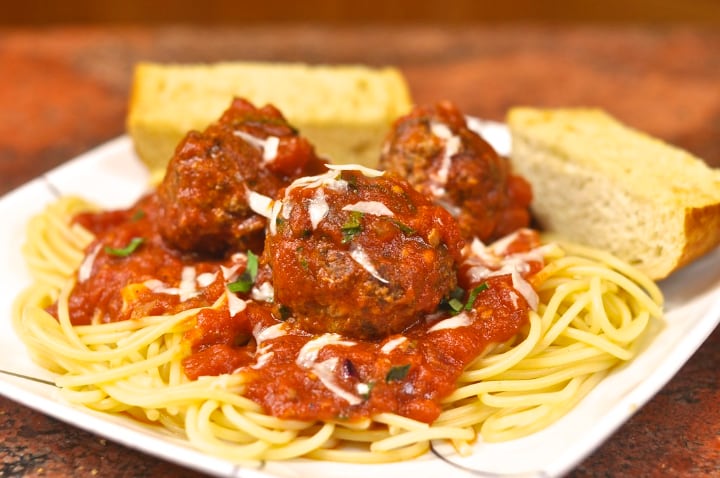
- Chocolate – Just like for dogs, chocolate is poisonous for rabbits.
- Peanut Butter – It will give your bunny a stomachache.
- Food like Bread, Cookies, Crackers, and Pasta –Theselead to enterotoxaemia (overeating disease) in bunnies.
- Yogurt Drops
- Avocado – Healthy for humans, deadly for bunnies.
- Iceberg Lettuce – They produce a chemical calledlactucarium that is harmful to your rabbit.
- Cauliflower – Causes bloating and gas in rabbits.
- Potatoes – These are starchy vegetables that are high in carbohydrates. They cause digestive problems in rabbits.
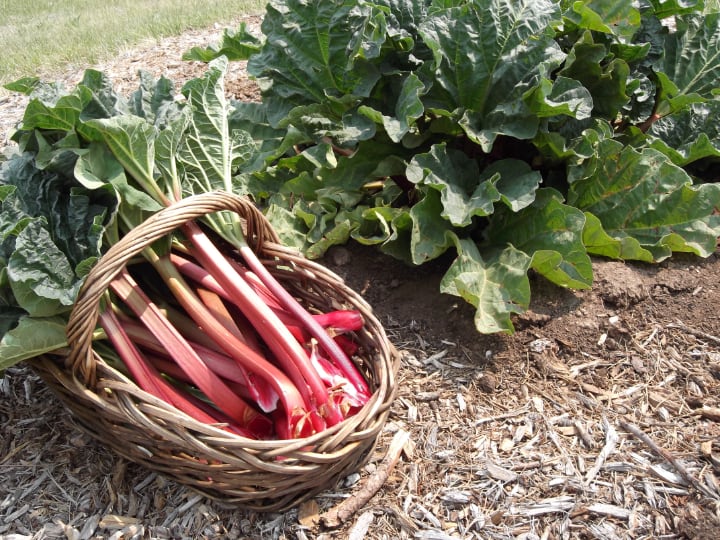
- Rhubarb – This seemingly safe garden plant is lethal for bunnies when consumed raw.
- Cereal
- Hamster Food
- Oatmeal – This is not the worst food for rabbits. Yet it’s not nutritious for them.
- Silverbeet – Leads to bloating in bunnies.
- Walnuts – These are high in fat and don’t have fiber.
Herbs can also be harmful rabbit food. Take a look at this list of herbs that are dangerous for your rabbit.
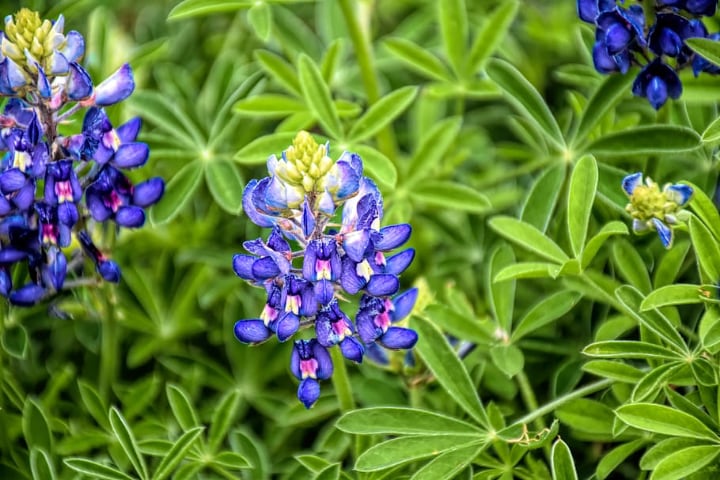
- Agave leaves
- Bluebonnet
- Bloodroot
- Blue-green algae
- Aloe
- Amaryllis
- Elder
The bottom line: Just because rabbits are plant-eating squishies doesn’t mean they can eat whatever they please.
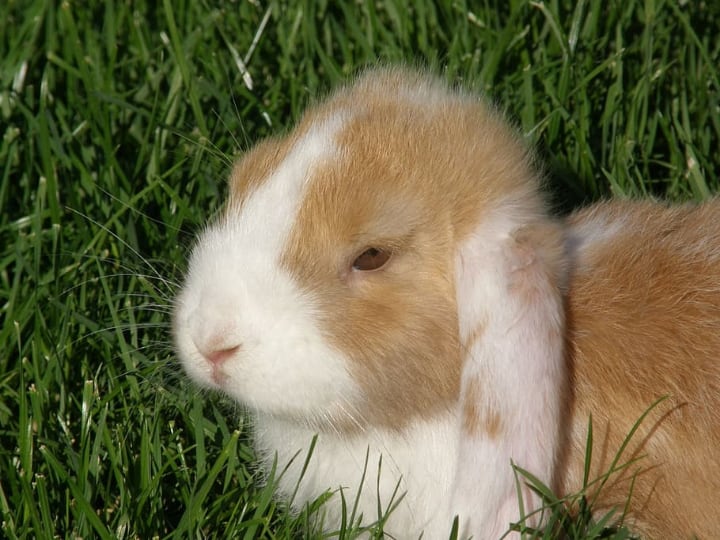
Do you feel that something is off with your Rabbit? Does it have diarrhea, fever, low appetite, weakness, etc.? It might be a sign of poisoning.
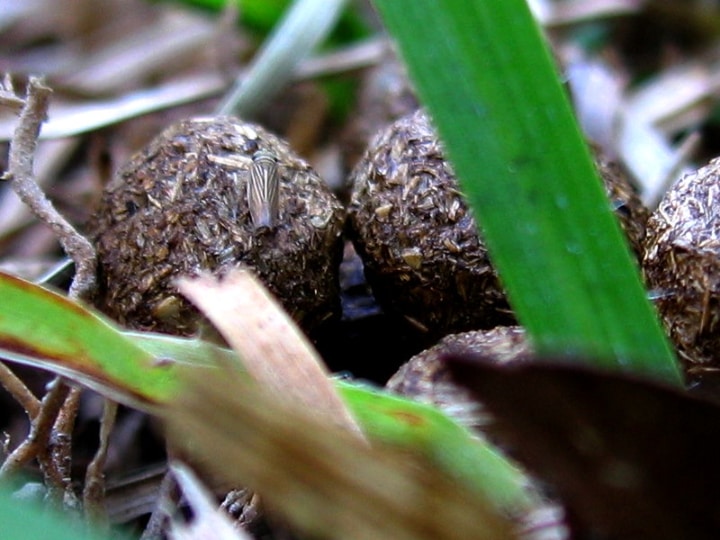
In this scenario, don’t be a procrastination hero and take your rabbit to the veterinarian.
How to Feed Your Rabbits
Now that you know which rabbit food is good for rabbits and which is not, here’s how you should feed it to them.
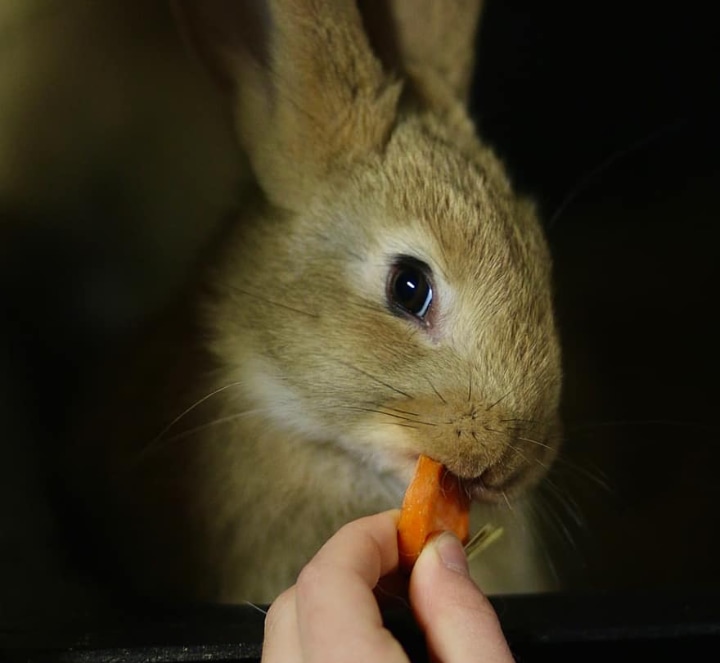
Step 1 – Find the Right Food
Find fresh hay or any recommended rabbit food we have mentioned earlier.
Step 2 – Wash It
Rinse veggies and fruits before serving. Then rake the food and place it in a bowl.
Step 3 – Use a Litter Box
Rabbit food can make a mess in your house or garden. To eliminate this issue, find a larger, high-sided litter box.
Step 4 – Add Some Hay
Lay some newspapers inside the litter box and place a generous amount of hay in the litter box. Plus, they will enjoy lying on them.
Step 5 – Provide Fresh Water
Put out a fresh, ceramic water bowl that is heavy at all times. You can use either a sturdy bowl or a bottle. Your rabbit might seem hydrated from the outside, but not from the inside.
Step 6–Change the Water Often
Change the water in the bowl at least once a day. Clean the bowl with soap and water daily.
Important: Give baby rabbits plenty of pellets. After 3-4 months decrease the amount. For 5 pounds of body weight, you should provide 2-4 cups of fresh veggies to your rabbit.
For more ideas, check out this video.
Food for Rabbits Frequently Asked Questions
Rabbits are pretty high maintenance cookies. They need constant care because they are delicate. Therefore, owners have a lot of questions when raising them in their homes.
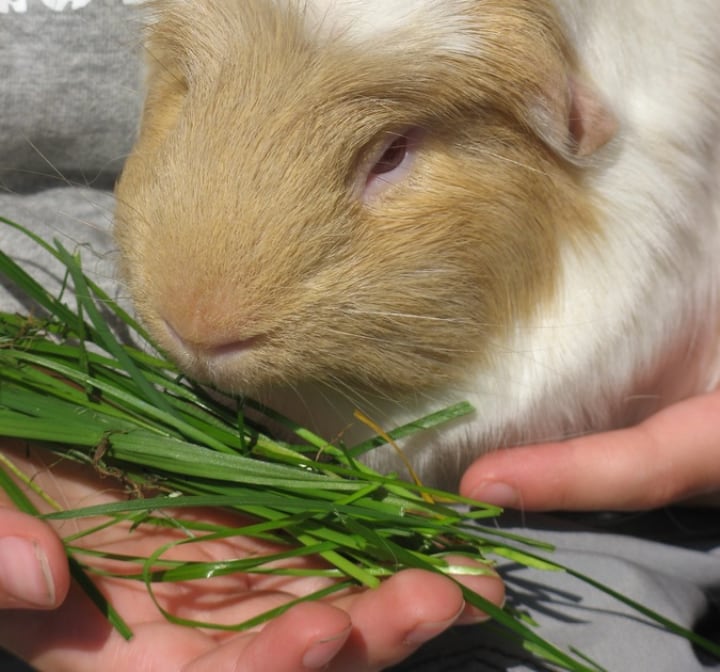
Take a look at these answers below if you have encountered the same issues.
What is the best food for rabbits?
The best food for rabbits is probably hay. But lots of veggies and herbs such as Radish tops, Carrot tops, and Basil are ideal too. You can give them occasional treats such as carrots or fruit like apples, mangos, or bananas.
What can rabbits eat and not eat list?
Bunnies can eat rabbit food like hay, veggies, herbs, flowers, and fruit. However, you should feed them pellets, and fruit in moderation. Refrain from giving them Peanut Butter, Bread, Cookies, Crackers, Pasta, Yogurt Drops, Iceberg Lettuce, Cauliflower, Potatoes, Cereal, Hamster Food, Oatmeal, Silverbeet, and Walnuts.
What foods can kill a rabbit?
Don’t ever give them Chocolate, Avocado, and Rhubarb as they are lethal for rabbits. Here’s a list of bad foods for rabbits.
What should I not feed my rabbit?
Don’t feed them Iceberg Lettuce, herbs such as Agave leaves, Bluebonnet, Bloodroot, Blue-green algae, Aloe, Amaryllis, Elder, and the other foods on our list. Avoid giving them unknown plants and flowers or human food.
What is rabbit’s favorite food?
Timothy, orchard, or brome hay would be the all-time favorite food of rabbits. At least think so. You’d have to watch your rabbits eating habits carefully just to be sure! Explore more best foods for rabbits.
Let’s Rabb-it Up
Now you know that rabbits’ tummies are delicate and need a ton of fiber. So, add to their diet lots of hay, veggies, and herbs. They don’t need extra vitamins on top of that.
Slowly incorporate new food and keep in mind that rabbits need constant chewing.
Give them lots of veggies every day and limit treats such as fruit for once or twice a week. Providing them with fresh water is also important.
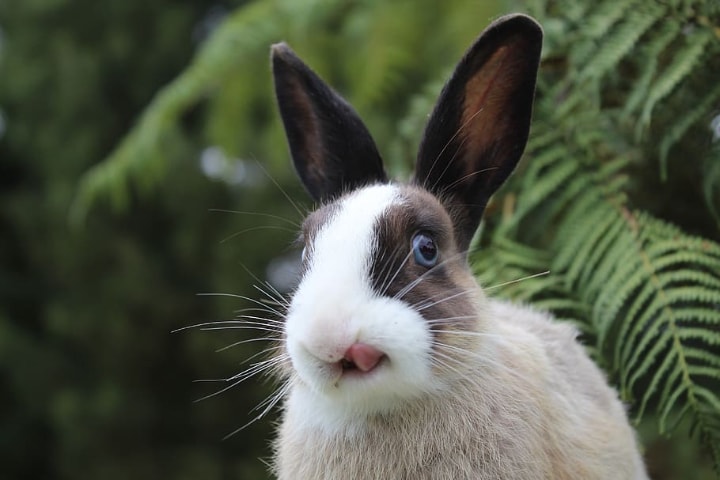
Follow these guidelines, and always find the perfect food for each type of rabbit to protect your little companion.
If you found this guide useful, share it with your friends. It’s for a good cause: together we can help spread awareness about the best rabbit food!
Do you face any other struggles while raising your rabbit, apart from feeding them all the time? Let us know if you have any other questions or thoughts in the comment section below!
And remember: with great fluff, comes great responsibility!

Leave a Reply